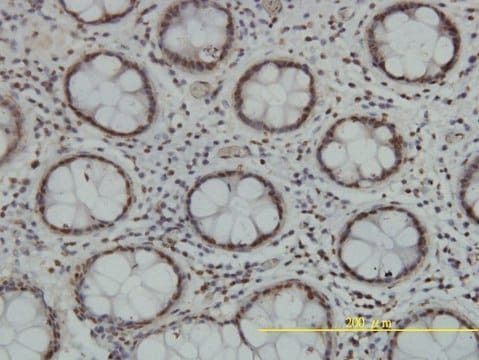WH0008658M1
Monoclonal Anti-TNKS antibody produced in mouse
clone 1A2, purified immunoglobulin, buffered aqueous solution
Synonym(s):
Anti-PARP5A, Anti-PARP5a, Anti-PARPL, Anti-TIN1, Anti-TINF1, Anti-TNKS1, Anti-tankyrase, TRF1-interacting ankyrin-related ADP-ribose polymerase
About This Item
Recommended Products
biological source
mouse
conjugate
unconjugated
antibody form
purified immunoglobulin
antibody product type
primary antibodies
clone
1A2, monoclonal
form
buffered aqueous solution
species reactivity
human
technique(s)
immunohistochemistry (formalin-fixed, paraffin-embedded sections): suitable
indirect ELISA: suitable
western blot: 1-5 μg/mL
isotype
IgG2aκ
GenBank accession no.
UniProt accession no.
shipped in
dry ice
storage temp.
−20°C
target post-translational modification
unmodified
Gene Information
human ... TNKS(8658)
General description
Immunogen
Sequence
TERKEGEVAGLDMNISQFLKSLGLEHLRDIFETEQITLDVLADMGHEELKEIGINAYGHRHKLIKGVERLLGGQQGTNPYLTFHCVNQGTILLDLAPEDKEYQSVEEE
Biochem/physiol Actions
Physical form
Legal Information
Not finding the right product?
Try our Product Selector Tool.
Storage Class
10 - Combustible liquids
flash_point_f
Not applicable
flash_point_c
Not applicable
ppe
Eyeshields, Gloves, multi-purpose combination respirator cartridge (US)
Certificates of Analysis (COA)
Search for Certificates of Analysis (COA) by entering the products Lot/Batch Number. Lot and Batch Numbers can be found on a product’s label following the words ‘Lot’ or ‘Batch’.
Already Own This Product?
Find documentation for the products that you have recently purchased in the Document Library.
Our team of scientists has experience in all areas of research including Life Science, Material Science, Chemical Synthesis, Chromatography, Analytical and many others.
Contact Technical Service






